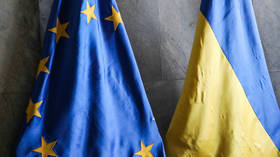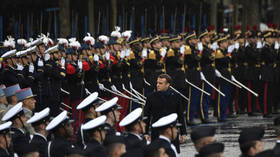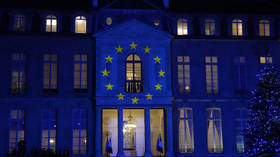Ukraine tensions have shown the worthlessness of the EU

There’s nothing like a crisis to expose the fact that the European Union is incapable of speaking with one voice. I suppose, in some ways, this is to be expected, as it is a bloc made up of 27 countries, all with their own different histories and national interests. This is why I have always maintained that, in the long run, it is doomed to fail.
The drama taking place on the Ukrainian border has brought these differences out into the open and revealed that the EU is a toothless tiger. It can issue statements and put on flashy shows of unity, but in reality – on this issue, at least – it has lost control of its member states.
For starters, the EU cannot even agree on who should be conducting the negotiations with Russia. Some seem perfectly happy to allow the United States to take the lead, while others are eager for the EU to muscle its way in and make a statement on the international stage.
Take, for example, the French president, Emmanuel Macron. He has called for the EU to start its own dialogue with Russia, thus cutting out the middle man. Indeed, during a speech delivered to MEPs in Strasbourg last week, Macron said, “Our continent’s security requires a strategic reinforcement of our Europe as a power of peace, a balancing power, particularly in its dialogue with Russia. I have been advocating this dialogue for several years… we need this dialogue.”
According to reports, this speech caused great concern in Washington, and calls were hastily made downplaying Macron’s statement. EU High Commissioner Josep Borrell even claimed that Macron “didn’t say that the Europeans were going to present their own proposals to the Russians.”
Borrell can spin what Macron said any way he wants, but the reality is that we all know the French have never been comfortable with Europe’s foreign policy being dictated or led by Washington. It has always been the case, and it always will be.
There is also a difference of opinion when it comes to sending weapons to Ukraine. Some EU member states are in favour, while others are opposed, and Brussels is proving itself powerless. This was emphasised following a meeting of EU foreign ministers on Monday, when Anze Logar, the Slovenian representative, told reporters that the question of helping Ukraine is up to each individual member state and not subject to harmonisation at EU level.
With the EU sidelined, member states are plotting their own courses. Those who are in favour of sending weapons to Ukraine include the Dutch PM, Mark Rutte, who recently said that, “We have the political space… should those requests come, to help defensively with weapons.”
Similarly, Estonia, Lithuania, and Latvia have all pledged to send weapons. This has met with the approval of the US State Department, which has given the green light for US-made arms owned by the Baltic states to be shipped to Ukraine.
Other countries have followed suit, including Poland and Spain. However, the decision of the Spanish government to send fighter jets and a warship to the Ukraine has caused a rift at the heart of its government. For example, Equality Minister Irene Montero, who is opposed to Spanish military hardware being sent, said: “We are people of peace. We are committed to peace, to deescalating the conflict, to avoiding military exercises in the area, to dialogue and diplomacy.”
Likewise, the decision of the Czech government to send weapons has been criticised in its parliament, with Freedom and Direct Democracy leader Tomio Okamura claiming that the government “is trying to draw the Czech Republic into a war.”
On the other hand, the new German government has remained resolute in its decision not to allow German-made military hardware to be moved to Ukraine. Chancellor Olaf Scholz justified this stance by saying that “Germany has not supported the export of lethal weapons in recent years.”
Moreover, some EU states also maintain a friendly relationship with Russia. Hungary’s PM Viktor Orban, for example, is scheduled to visit Moscow for discussions with Vladamir Putin in early February. Orban shows no sign of cancelling his visit, even though he is under pressure to do so from opposition parties.
While all this is going on, the EU is standing idly by as a passive spectator. It cannot influence events, because it does not have the ability to do so. It is also proving that it has no influence over its own member states. Perhaps this is why the bloc was cut out of the recent negotiations between Russia and the US in Geneva?
The situation has also highlighted why the EU will never have a coherent foreign policy. There are simply too many vested interests, and when push comes to shove, national priorities always trump loyalty to the bloc. The famous proverb “Too many cooks spoil the broth” perfectly sums up the EU and its fractured response to the ongoing Ukrainian border issue.
The statements, views and opinions expressed in this column are solely those of the author and do not necessarily represent those of RT.















